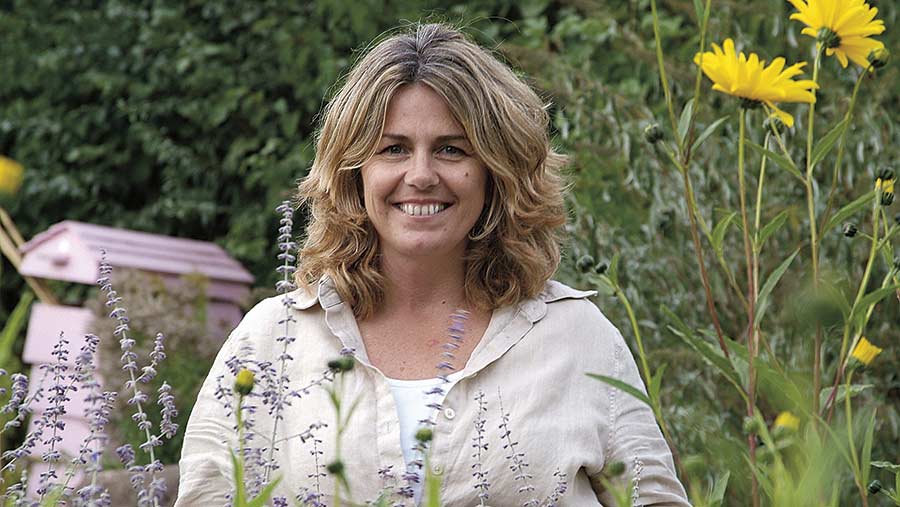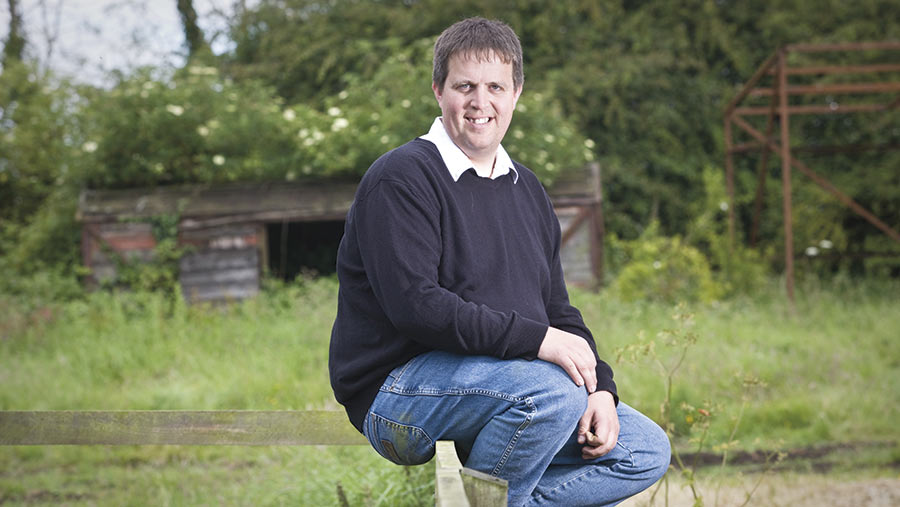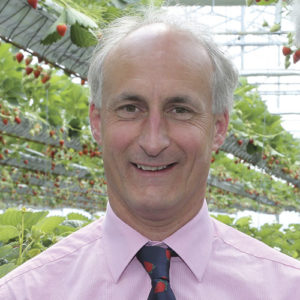Finalists line up for 2017 Nuffield Bullock Award
At next week’s Nuffield Farming Conference the Stephen and Gill Bullock Award will be presented to the Nuffield scholar judged to have made the best use of their Nuffield experience 10 years after completing their studies.
The award comes with a £1,000 cash prize and is made in memory of Steven Bullock, Farmers Weekly’s farms manager from 1963-88 who then became director of the Nuffield Farming Scholarships Trust.
This year there are four finalists.
The social media evangelist: Heather Gorringe, founder, The Great British Florist

Heather Gorringe
When the world financial system went into meltdown in 2007, in the middle of Heather Gorringe’s Nuffield scholarship year, her farm diversification business was hit hard.
Following the crash, the average order value for Wiggly Wigglers, her business selling natural gardening products, plummeted from £46 to £26.
“We were just about wiped out,” she recalls. “We had to make four people redundant and we lost our warehouse.”
See also: 2016 Bullock award finalists revealed
But smart use of social media, the focus of her Nuffield studies, has played a vital part in helping her to rebuild the business, including a highly successful expansion into UK-grown flowers sold directly to the public under her Great British Florist brand.
Heather was already experimenting with social media when she applied for a Nuffield scholarship, but her travels in North America opened her eyes to the potential of these new tools.
She saw how businesses were bypassing traditional marketing techniques and using social media to communicate directly with customers and potential customers.
Fired up by their successes, she ditched her traditional paper catalogue and threw herself into this new world.
A decade on, the flower business is thriving. Social tools and cloud-based digital services are embedded throughout the operation. She uses:
- Pinterest and WhatsApp to promote and sell wedding flowers
- Eventbrite and Facebook to promote the courses she runs
- FreshChat for customer service
- Resource Guru to organise her team’s work schedule
She also produces a short video each week, which she uploads to her YouTube channel. These have now clocked up more than 1m views.
The rapid growth of the Great British Florist has benefited other UK farmers; the business now sources flowers from nine other farms as well as the home farm in Herefordshire.
It has also spawned a clutch of copycat businesses, growing their own flowers and selling them in their local areas. Heather is sanguine about this competition: “Technically, we’re well ahead,” she says.
Over the past decade Heather has been a social media evangelist, encouraging other farmers and agricultural businesses to tap into the benefits. She has spoken at hundreds of meetings, from local Women’s Institutes groups to Farmers Weekly’s AgriMarketing Summit.
Social media is now an important tool used by thousands of farmers to promote their businesses and put their case to the British public on issues ranging from the importance of glyhphosate to the dangers of dogs near livestock. Heather can justifiably claim to have played a part in helping farmers to find their social media voice.
The firepit maker: Andrew Gage, founder, The Firepit Company

Andrew Gage © Tim Scrivener
When Andrew Gage won a Nuffield Scholarship, to investigate the development of a warm-water aquaculture industry in the UK, he was running a fish farming business on the family farm he had recently taken over.
But before he could embark on his travels disaster struck: Unexpected legal problems with one of his suppliers forced him to close the fish business.
The calamity put his entire farm under threat, and pulled the rug from under his Nuffield plans.
Andrew offered to give up the scholarship, but was persuaded instead to change his topic – to how entrepreneurs can overcome serious challenges to build farm diversification businesses.
He travelled to Australia and South Africa, seeking out farmers who had developed successful diversifications in tough conditions.
“I met some great farmers who were doing amazing things with nothing,” he says.
One farmer was using a cement mixer to mix dried cattle manure with chopped pea straw, selling it in garden centres as an alternative to peat for bedding.
“He was making about US$180,000/year [£137,341/year] from that,” Andrew smiles.
Inspired by what he saw, and convinced that a positive, can-do mindset was the key to success, he returned to the UK fired up to rebuild his business.
He sold half of the farm to raise cash, relieving the immediate pressure on his finances. This also allowed him to expand the duck-rearing operation he had set up after reading in Farmers Weekly that Gressingham was looking for new suppliers.
This is now a six-figure business, selling almost a quarter of a million ducks a year to Waitrose.
He’s also built business units on the farm, which he rents out.
But Andrew’s biggest success is his newest venture, making spherical metal firepits with intricate designs cut into the metal.
He started the business after seeing a firepit for sale on Facebook for US$17,000 (£12,971). Though he had never used a plasma cutter and only achieved an E in his art GCSE, Andrew found a company in China that could supply hollow metal spheres and set to work.
Four years on he now sells more than 800 firepits a year.
In 2017 he expects to turn over more than £1m, with firepits his biggest earner. Having laid off all but two of his seven staff in the bad times, he now employs nine people just in the firepit operation.
Not content with this, Andrew is working on plans for additional on-farm businesses. He recently got planning permission for a fishing lake – a personal passion. Once that’s established he’d like to add accommodation – perhaps upmarket lodges full of arty products that customers can buy.
The Fruit Innovator: Chris Newenham, Joint MD, Wilkin & Sons

Chris Newenham
The decade since Chris Newenham completed his Nuffield studies has been highly successful both for him and the business he now jointly runs – fruit grower and jam maker Wilkin & Sons.
Chris, who was also shortlisted for the Bullock Award in 2016, spent his Nuffield year investigating innovative approaches to fruit growing in Australia, New Zealand, Chile and China.
One of his aims was to help clarify his thinking on a key question facing the business at that time– whether to continue growing its own fruit for its jams or to buy it in from cheaper producers overseas.
Back then the breakeven cost of growing fruit on Wilkin & Sons’ Essex farm was about £1,600/t, but overseas producers could deliver the same fruit to the UK in individually frozen form for about £400/t.
Chris’ input helped the business come to its decision, which was to keep production in the UK.
Eleven years on, there are no regrets. Today, the price differential has shrunk significantly: UK costs now come to about £1,800/t but the price for externally-sourced fruit has leapt to £1,200/t.
In the intervening years, Wilkin & Sons has transformed the way it grows its fruit, partly inspired by what Chris saw on his Nuffield travels. The results include higher yields, better quality and greater consistency in the fruit produced.
Innovations have included the adoption of polytunnel production; a move to growing fruit in substrate on raised platforms rather than in soil; the introduction of new varieties; and the use of novel irrigation technology from Israel that makes use of waste water from the company’s jam-making factory.
The past 10 years have seen the business as a whole double in size, exceeding £41m turnover as a group in 2016. But its farming operations have grown more than tenfold over the same period.
In 2006 almost all of the fruit produced went into the company’s Tiptree-branded jams. Now the farm also produces about 1,250t of fruit for direct retail sale.
The company is also developing new fruit-based products – it recently launched a range of fruit gin liquers.
Chris, who became joint managing director last year, is understandably proud of the journey he and his company have taken since he joined 15 years ago. “Back then the business was painfully traditional,” he says. “Now we are leading the way”.
The food business nurturer: Rob Ward, Joint Founder, The Grocery Accelerator

Rob Ward © Jonathan Page
In his Nuffield scholarship year Rob investigated how companies around the world were developing new ways to connect food producers to retailers.
At the time he was running a successful farm shop and regional distribution service that he had built from scratch. But his Nuffield experience convinced him there were bigger opportunities in the food sector.
On his travels he had set up a blog to share his findings with a wider audience, and started a network on LinkedIn.
He soon found himself with 40,000 food and drink business contacts, and was regularly being asked to act as an intermediary, putting his contacts in touch with other businesses in the sector.
So when, on returning to the UK, a private equity firm offered to buy his existing business for £1m he jumped at the chance.
“Nuffield had opened my eyes to international opportunities and ideas, and gave me the confidence and determination to sell what I had built and leap into the unknown,” Rob explains.
He used some of the cash from the sale to launch a new business called myfoodtrader.com, a matching service for food and drink businesses.
The service was popular, but Rob struggled to turn this enthusiasm into a big enough revenue stream and after a couple of years the business folded.
Undeterred, Rob looked for a new idea.
In 2014 he founded The Grocery Accelerator with two business partners. The idea was to bring to the food and drink industry the “startup accelerator” model that had been pioneered in the US high-tech sector.
The Grocery Accelerator finds innovative UK food and drink companies through a selective coaching and mentoring process, and then introduces businesses to investor funding.
There are now 13 companies in the programme, with a total investment of £7m. The Grovery Accelerator has a stake in these, charging a monthly fee for its services.
Rob has also negotiated a deal with online food retailer Ocado to introduce new food producers to Ocado’s national customer base through the Ocado Discovery Shop. All the businesses in the shop are sourced by The Grocery Accelerator.
He’s now looking to expand the concept to other major retailers.
Bullock Award judges
- Stephen Fell, chairman of Linking Environment and Farming
- Michael Jack, agriculture and food adviser to HSBC
- Karl Schneider, editor of Farmers Weekly
